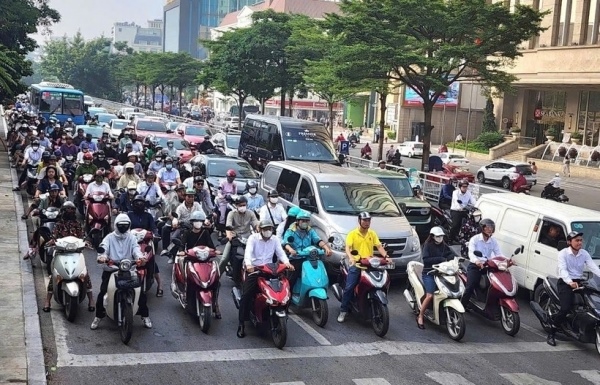Vehicle fee structure aims for fairness for localities
Vehicle fee structure aims for fairness for localities
Vietnam’s sweeping overhaul of vehicle registration fees, including a cut for motorcycles and a shift in valuation authority to local governments, is expected to reduce consumer costs, simplify tax administration, and provide a timely lift to the recovering transport sector.
From July 1, a flat 2 per cent registration fee for new motorcycles has come into effect nationwide, replacing the previous 5 per cent rate that applied in major urban centres such as Hanoi and Ho Chi Minh City.

Vehicle fee structure aims for fairness for localities, illustration photo/VNA |
The policy aims to harmonise tax obligations across regions and create more equitable conditions for vehicle ownership.
The reduction offers significant cost savings for consumers. A standard Honda Lead scooter, priced at VND40 million (around $1,600), previously incurred a registration fee of $80 in big cities. Under the new policy, the fee drops to just $32.
For high-end models like the Honda Gold Wing, which retails at around $49,200, the fee is reduced from $2,450 to $980. Even entry-level models such as the Wave Alpha 110, priced at around $710, now carries a fee of $14, down from over $35.
Used motorcycles remain subject to a 1 per cent registration fee from the second transaction onward, consistent with previous regulations.
According to the Ministry of Finance (MoF), the move responds to recent administrative restructuring, which involved merging communes and districts nationwide.
“The unified fee structure ensures fairness for residents in newly consolidated localities, preventing them from being subject to higher rates based on their previous administrative designation,” the MoF noted in its statement.
Importantly, the decree also decentralises the authority to issue vehicle valuation tables from the MoF to provincial people’s committees. This measure is designed to enhance administrative efficiency and allow local governments to adapt more responsively to market conditions and regional dynamics.
The revised fee schedule also includes other vehicle types. Four-wheeled electric buggies used in golf courses and resorts, as well as specialised utility vehicles, are now subject to a 2 per cent fee. Passenger pickup trucks face a 10 per cent rate, similar to regular passenger cars.
Double-cabin pickups and cargo vans with two or more rows of seats and a fixed partition separating passenger and cargo areas will be taxed at 60 per cent of the standard car registration fee.
Industry stakeholders seem to have responded positively. “This is a practical, demand-driven policy that lowers the upfront barrier for consumers,” said Nguyen Van Hieu, sales director at a Hanoi-based motorcycle dealership. “We expect to see stronger purchasing activity from July onwards, especially among first-time buyers and customers who had previously delayed purchases due to high fees.”
Vietnam’s motorcycle market, which had endured a downturn during 2022–2023, has shown clear signs of recovery in 2025. According to industry estimates, over 1.32 million units were sold nationwide as of the end of May, marking a more than 20 per cent increase on-year. The growth is particularly robust in the electric scooter segment, where affordability, fuel savings, and ease of use continue to draw in younger urban consumers.
Tax experts also view the reform as a positive development in Vietnam’s broader fiscal restructuring.
“By simplifying the registration fee system and empowering local authorities, the government is easing the burden on both taxpayers and tax administrators,” said Tran Thi Hoai An, an independent tax researcher based in Ho Chi Minh City. “This aligns with ongoing efforts to decentralise public finance and make tax policies more adaptive.”
- 09:53 18/07/2025




























